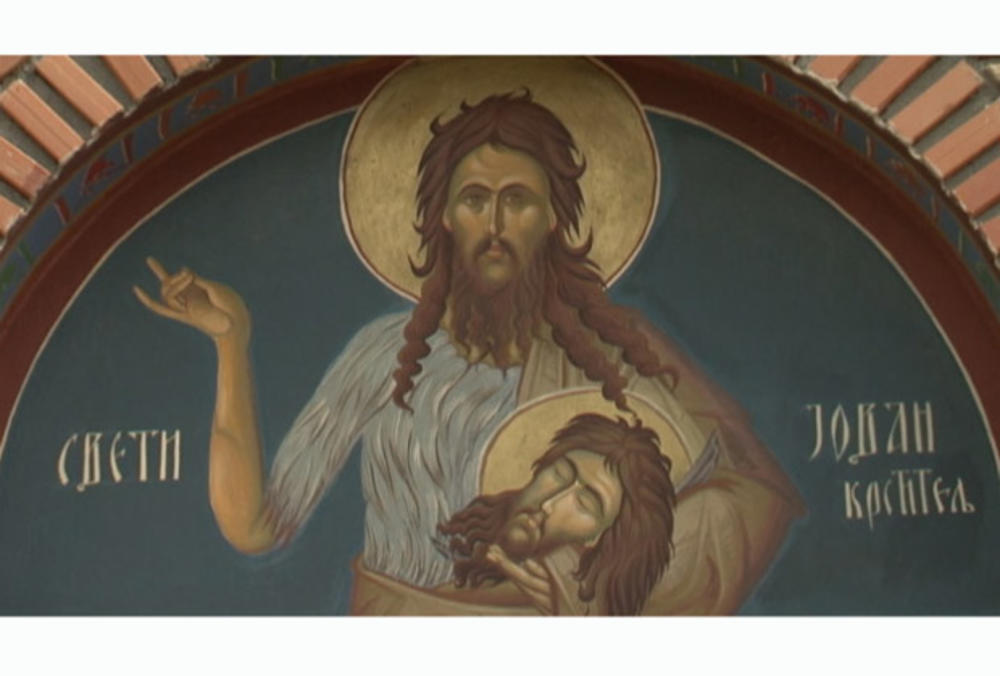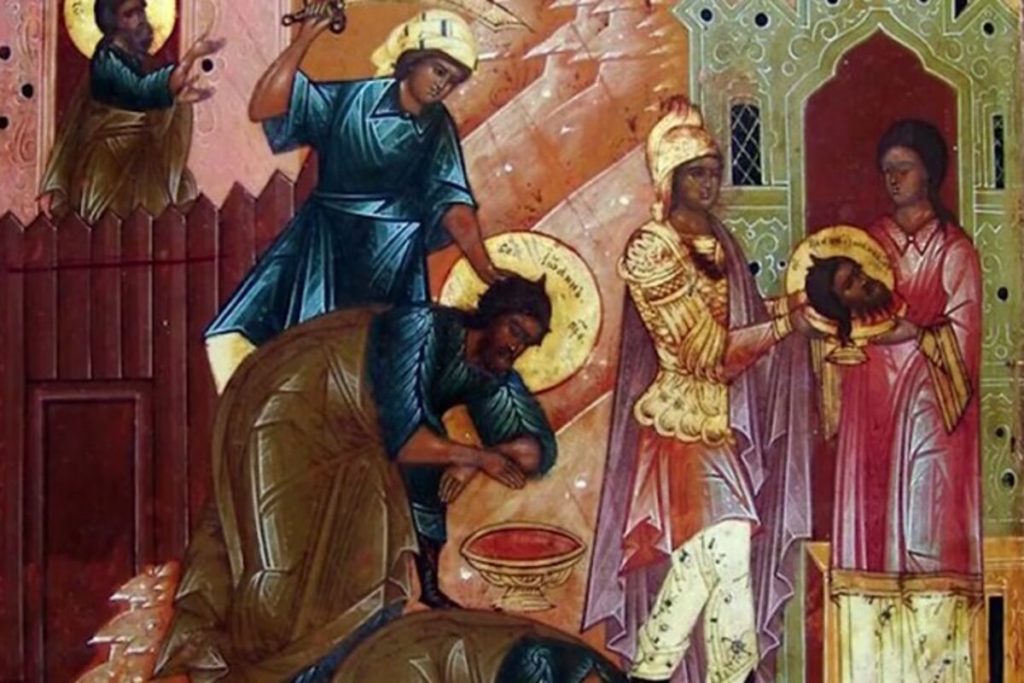The whole life of St. John the Forerunner, from his first days, was completely dedicated to the One who came after him. In the days of the massacre of the infants in Bethlehem, he was also wanted by Herod, but his mother Elizabeth fled with him to the desert, where she rested after forty days. At the same time, his Father Zacharias was killed by Herod’s servants, in the Temple.
The desert raised John, and he remained there in silence for thirty years, until the Word of God came to him, commanding him to preach repentance and call people to prepare the way of the Lord (Luke 3:2)
After half a year from the beginning of his preaching, preparing the Jews to expect the quick coming of the Savior and surrounded by disciples, most of whom became disciples of Christ, John the Baptist baptized Christ. The secret of the Holy Trinity was then revealed to him. Telling those around him that the Lamb of God, Who takes away the sins of the world, is present, John gradually found himself in the shadows and everyone began to follow the new Teacher.
However, instead of grieving, John began to rejoice. When his especially devoted disciples asked him about his lack of concern for his declining fame, he responded with words that clearly describe his personality:
“I am not Christ, but I was sent before Him.” He who has a bride is the bridegroom, and the friend of the bridegroom stands and listens to him, and rejoices with joy at the voice of the bridegroom. This, then, is my joy fulfilled. He must increase, but I must decrease.” (John 3:28-30)
Shortly after this, his word thundered against Herod, so he was cast into prison, where his human life ended. He was beheaded during Herod’s feast. The beheading of St. John the Baptist, which ended his earthly life, at the same time, began his new and glorious preaching as the Forerunner. The soul of St. John the Baptist, leaving his ascetic body, went to hell, the place where were the souls of all those who died before the Savior’s death on the Cross. The souls of all from the beginning to Adam were there.
However, the Holy and Righteous soul of Saint John the Baptist did not go there with the aim of tasting the dark state of alienation and distance from God. The “Friend of the Bridegroom”, who baptized Him, suffered for his righteousness, brought hope in the coming of the Kingdom of God, preached to all, to prepare the way for Him, was inextricably linked with Him through his devotion, witnessing Christ everywhere, as His messenger , sent before Him.
Descending into hell, John continued the preaching he preached on earth – preaching about the Kingdom of God that has come near. The souls of the righteous, from the Old Testament, withered in hell, waiting for the fulfillment of the coming of the One who would defeat the serpent, as was said to Adam. The prophets, who had seen this before in the spirit, awaited the coming of the fulfillment of the revelations that had been revealed to them. These souls, deprived of the light of the glory of God, were tormented in waiting for the fulfillment of their hope. John came, descending into hell, bringing the Good News that soon the kingdom of hell would be destroyed.
Those who were waiting for the Redeemer will soon see Him and be freed from Him, John testified that the Son of God had already come to earth and that after His baptism, he testified that the Holy Spirit descended and remained on Him (John 1:33-34 ).
John’s sermon regarding the coming of the Savior was addressed not only to the souls of the righteous, but to all those who were in hell. He appeared in hell to prepare the way of the Lord, as he had prepared it on earth. The descent of John the Baptist into hell and his preaching of the Gospel was a proclamation of joy to those who languished there.

The souls of the dead, except for the most hardened sinners, listened to the Baptist’s sermon. Therefore, when Christ descended into hell after His death on the Cross, He was welcomed not only by the Old Testament Righteous, but also by the souls of all those who were once disobedient and opposed the longsuffering of God in the days of Noah and throughout time, when sin reigned among men (1 Pet. 3:20).
Hell was destroyed by Christ’s descent into it; the dark dungeon shone with light; the souls of the deceased were taken to the Kingdom of Heaven. The entrance door to this infernal doom was the descent of the Baptist. Fulfilling his preaching as a Forerunner on earth, he appeared as Christ’s Forerunner in hell. His beheading is not only the climax of his earthly exploits, but also the beginning of a new and glorious preaching.
Among them, who are born of women, there is none greater than John the Baptist (Matthew 11:11; Luke 7:28) as Christ said of him.
“For this is the one about whom it is written: Behold, I am sending My angel before Your face, who will prepare Your way before You.” (Luke 7:27)
These words of Christ Himself testify to John’s spiritual greatness and his high goal in the work of saving the human race. He appeared as a servant and preacher of God, like no other man in the world, beginning to preach and glorify Christ before His birth, and ending even after His death, ascending with Christ to the Kingdom of Heaven after the destruction of hell.
As the greatest among the Righteous, a worthy place has been prepared for him in the Kingdom of his Friend, where he now resides, awaiting his revelation in all glory and the victorious feast of the Lamb of God at the Second Coming, when he will gather his wheat into granaries, and he will burn the chaff with eternal fire. (Matthew 3:12; Luke 3:27).
His beheading was the final feat of his on earth, and the last step to receive the greatest reward in the Kingdom of Heaven; while for all those in hell it was the rising of the morning star, before the appearance of the Sun of Justice.
Just as the Birth of Saint John the Forerunner and Baptist is the beginning of the Gospel for the living, so his beheading is the beginning of the Gospel for the dead.
“The glorious beheading of the Forerunner is part of the Divine forgiveness, because he preached to those in hell the coming of the Savior.” (Kondak Praznika).
Saint John Maksimovich of Shanghai

